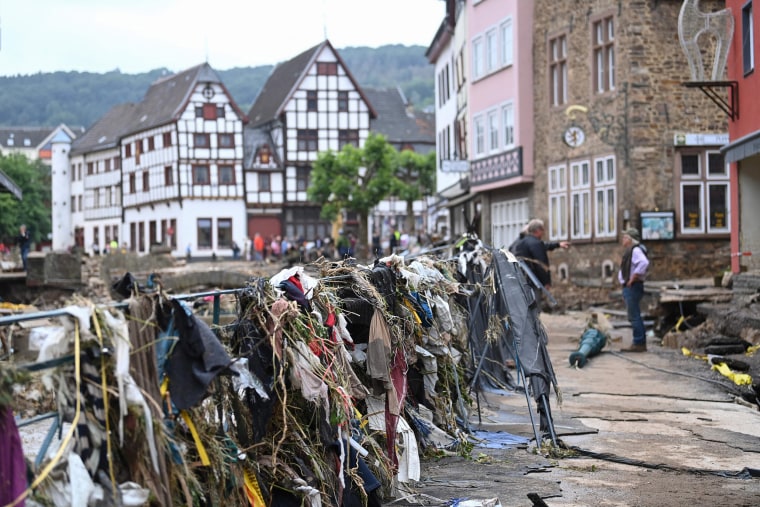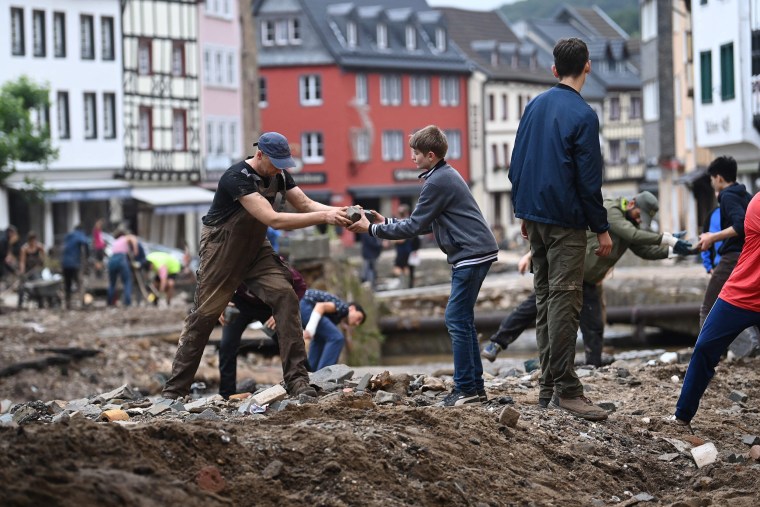German officials on Tuesday were under growing pressure to explain why one of Europe's richest countries was apparently unprepared for catastrophic floods that have so far claimed the lives of close to 200 and left hundreds more missing.
Chancellor Angela Merkel on Tuesday will make her second visit to one flood-hit area, the historic spa town of Bad Münstereifel, about 20 miles southwest of Bonn.
The normally popular tourist spot with traditional black-and-white buildings and cobbled streets lies obliterated after several months' worth of rain landed in the space of 24 hours Thursday into Friday.
The death toll from the flooding in Germany stands at 197, with at least 300 missing and 749 injured, according to the police and affected regional governments.

Many survivors have been left to pick up the pieces of shattered homes.
"Everything is destroyed on a scale I wasn’t able to imagine before I saw it today," said Roman Veith, a doctor who was helping his aunt salvage belongings from her ruined house in the riverside village of Dernau. "It’s like hard mud, you almost can’t get it with a shovel," he said.
"Climate change has arrived in our backyard here in Germany," added Veith, 39.
Germany military helicopters roared overhead, moving supplies from one end of the valley to the other. Like many towns in the flood zone, Dernau is without power.
The number of dead is expected to rise as rescue and clear-up operations continue across the west of Germany, as well as parts of neighboring Belgium, where at least 31 people have died and dozens are missing.
Belgium held a day of national mourning Tuesday in honor of the dead, some of whom were killed when a dozen houses alongside a river collapsed in the town of Pepinster in the east of the country. Thousands in The Netherlands were forced to evacuate last week after water breached flood defenses in the south.
Merkel visited the town of Schuld on Sunday, where she warned that the floods were connected to climate change.
"The German language hardly knows any words for the devastation that has been caused here," she said during a speech there.
The death toll has led to questions over why so many people seemed to have been surprised by flash flooding, with opposition politicians suggesting the death toll revealed serious failings in Germany's flood preparedness.
Federal Interior Minister Horst Seehofer, responding to the criticism during a visit to Bad Neuenahr-Ahrweile, defended the system, in which the German National Meteorological Service issues warnings to each of Germany's 16 states and from there to districts and communities, which then decide at a local level how to respond.
"It would be completely inconceivable for such a catastrophe to be managed centrally from any one place," Seehofer told journalists on Monday. "You need local knowledge."

Seehofer, however, called for all layers of Germany's government — local, state and federal — to work together in future and admitted things could be improved.
"I'm not ruling out the fact that we have to improve one thing or the other," he said, according to the German DPA news agency.
The DWD weather service warned on Monday, July 12, that heavy rain was heading to western Germany and that flooding was likely. On Wednesday morning, it said the risk of flooding was increasing and called on the population to seek guidance from local authorities.
Download the NBC News app for breaking news and politics
Economy Minister Peter Altmaier told the Bild newspaper Monday, "We will have to look at whether there were things that didn't go well, whether there were things that went wrong, and then they have to be corrected."
A regional government has pointed to another problem: Covid-19.
"At the moment, a lot of people are coming together in a very small space to overcome the crisis together. We now have to be careful that dealing with the disaster does not turn into a super-spread event,” David Freichel, a spokesperson from the Rhineland-Palatinate state leadership office told the RND newspaper network.
Carlo Angerer reported from Bonn, Raf Sanchez reported from Dernau and Patrick Smith reported from London.

